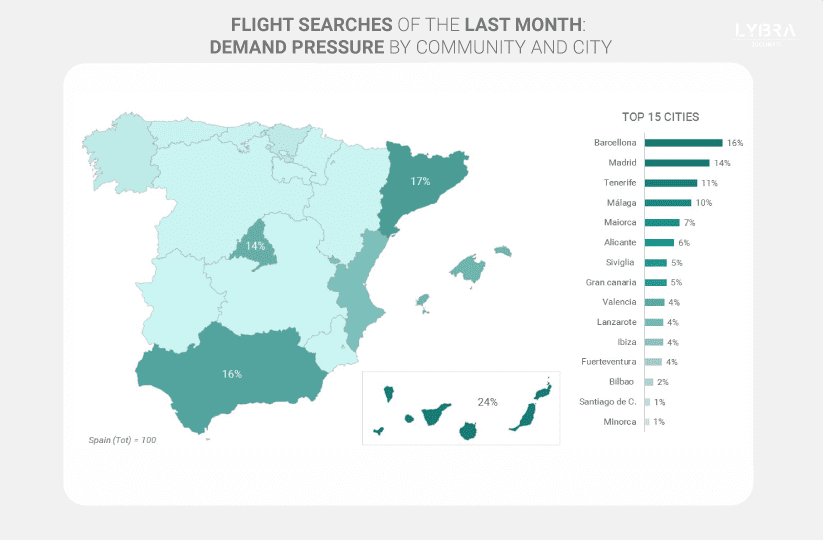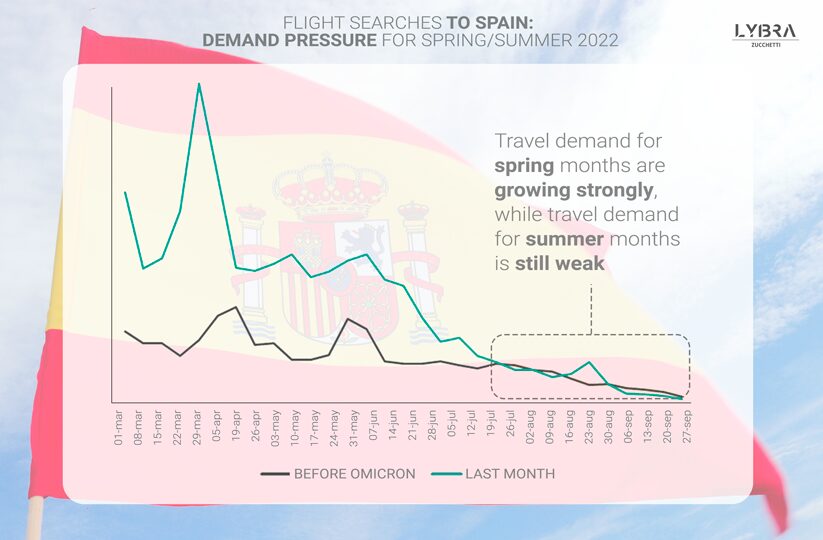Spain is very optimistic about the recovery of tourism in 2022, and even predicts that, this year, the country will be able to recover two-thirds of the travelers of 2019. These are almost utopian words after two years of pandemic, especially since the tourism industry in various parts of the world has tried several times to announce the recovery of the travel industry, without ever really succeeding.
Today, there seems to be more confidence in the air; although we have not yet left the Omicron variant behind us, we are seeing gradual improvement that moves us away further away from the official term “pandemic” every day. This is a view shared by other countries and even travellers, generally, who also feel more confident about the idea of traveling this year. This tentative positivity is slowly warming the global tourism industry, and we are beginning to see a substantial increase in demand for travel in some countries.
STRONG DEMAND FOR THE SPRING MONTHS
Spain is eager to recover its tourist flow and is already planning for the coming months. In support of the expectation and to emphasize the importance of recovering tourism as early as Spring, Fernando Valdés, Spain’s Secretary of State for Tourism said: “The first milestone is Easter week. It will give us a preview of what the rest of the year will be like.” The country expects to attract tourists thanks to the fame of Semana Santa, but it is only by examining actual flight search data that we can confirm whether the news looks good for Spain, for the rest of 2022.
Data on flight searches strongly confirm the country’s hope: during the last thirty days (25 December – 23 January) travellers from all over the world have searched for approximately 6,000,000 flights to reach the peninsula, most wanting to travel to Spain in the Spring. Flights departing from March to May account for 71.8% of the total, while flights for the summer months account for just 28.2%. This data is very significant: it has a strong positive value because it shows a strong short-term interest on the part of travellers, but it also shows that the fragilities of tourism are still high.
The fact that there is such a strong disparity between short-term and medium- to long-term travel indicates that there is still little confidence in the future among travellers. It’s important to remember that travelers’ travel research/planning phase typically takes place long before the actual booking phase and when you have such low summer demand, at this time of the year, is a clear sign of market distrust. As you can see from the graph above, demand pressure for the summer months is at the same levels as pre-Omicron periods.
THE MOST POPULAR PERIODS
As such, Spring will be very indicative for future forecasts in Spanish tourism. Currently, 52.6% of all searches are for short-term flights: 28.1% are for flights arriving in March, 24.5% are for flights arriving in April and 19.2% are for flights in May. Unfortunately, the peak demand is not for the Easter week: according to the data, tourists are looking for flights primarily for the week from March 29 to April 4, with a weight on the total of 10.5%. Semana Santa only earned 7.4% of the flight searches, which is a significant volume, but not in first place; that being said, the distribution of demand varies greatly between the different Autonomous Communities: for airports in Andalusia (the most famous destination for Semana Santa celebrations) there is a strong peak in demand for April 14 and 15.
The main reason for this difference is that there is a still high demand for beach destinations: despite the fame of Semana Santa, the most desired destination is the Canary Islands archipelago indicated by the fact that the island airports are among those with the strongest tourist demand.

About Destination
Destination is a market intelligence project created by Lybra – developers of the most complete, machine learning, data-centric Revenue Management System (RMS) available on the market – to share real-time, region-specific statistics, information and trends in the world of tourism.
Every day, Lybra analyzes millions of datasets – data collected from thousands of hotels’ PMS and flight search data from a leading metasearch booking engine – to help hoteliers “look ahead to better understand the present;” in other words, Lybra helps hoteliers understand the upcoming demand for their destination and gives them the revenue management tools and actionable insights necessary, to maximize bookings and revenue.
The aim of Destination is to give hoteliers and DMOs a more expansive view of tourism news and trends in different regions around the world. Destination produces weekly Travel Demand Reports, which share tourism developments for a specific country/region and analyze how the region’s travel news has impacted tourist demand. Follow Destination on LinkedIn to gain access to the upcoming Travel Demand Reports, which are published every Tuesday.










